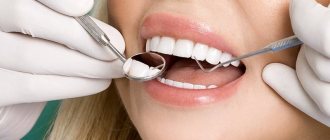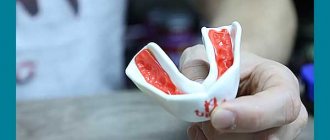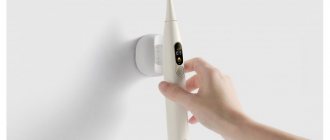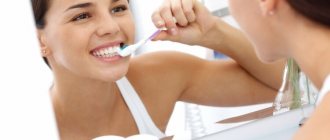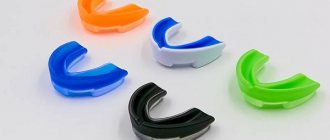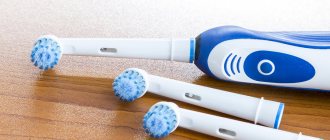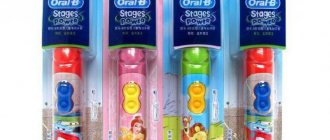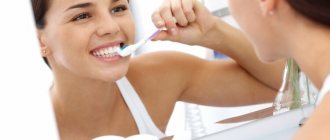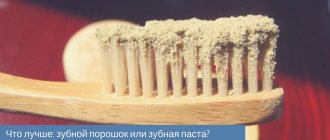The predecessor of paste was tooth powder. Since the 18th century, various compositions have been selected to keep teeth clean.
For those who have forgotten or have never used tooth powder, let us remind you that it is a dry paste. The powders contain abrasive substances, well crushed. Thanks to this, you can thoroughly clean tartar or stains characteristic of smoking. The results of whitening will be visible within a couple of days.
Types of tooth powders
The types of cleaning products are influenced by the age of the consumer, the direction of use and preferences associated with a particular aroma.
The most common types of product are:
- with cinnamon and ginger;
- mint;
- with nutmeg;
- children's;
- special;
- family;
- bleaching. Tooth powder, thanks to the good abrasive action of its components, can be used to clean and whiten teeth; The composition of the infant formula additionally includes softening components.
Advantages and disadvantages of the cleaning product
The popularity of this product even today, after the advent of toothpastes, is explained by a number of advantages:
- natural composition - all components included in the tooth powder are environmentally friendly and natural;
- whitening properties - since calcium carbonate is a fairly strong abrasive, it completely removes yellow plaque from teeth and allows you to achieve noticeable lightening of the enamel in just a few applications;
- antiseptic properties - essential oils contained in almost all tooth powders prevent the growth of bacteria in the oral cavity;
- anti-inflammatory properties – essential oils help reduce inflammation and bleeding of the gums;
- restoration of acid-base balance in the oral cavity.
However, this tool also has disadvantages:
- tooth powder cannot be used daily - calcium carbonate is a fairly strong abrasive and, with frequent use, can lead to abrasion and thinning of the enamel. For people with hypersensitive teeth, the use of tooth powder is completely contraindicated;
- due to the powder form, many active ingredients cannot be added to such products;
- the packaging in which most powders are sold is not airtight - pathogenic bacteria can easily get into it;
- Some people may be allergic to the essential oils contained in the powders.
However, the negative consequences of using tooth powder can be avoided if you follow certain rules when using it.
Composition of tooth powder
In addition to the main component - calcium carbonate, clay, sodium carbonate or aluminum chloride, flavorings and other related substances are added to the product in the form of additives. For example, sea salt actively fights bacteria and accelerates tissue regeneration. Dry crushed herbs eliminate bleeding, disinfect, refresh the oral cavity, and relieve inflammation of the gums. Essential oils of mint and eucalyptus, for example, act as antiseptics. Copes perfectly with bacteria and eliminates bad breath - cinnamon. Tooth powder for children has a finer crystalline structure. This composition more gently cleanses the thin enamel of children's teeth.
Evolution
The appearance of the first tooth powder dates back to the 2nd century BC. e.. Then the product was made from crushed shells, corals, pumice, eggshells and animal bones. Such a drug could not boast of a soft effect, and severely scratched the enamel.
Over time, the composition of the powder changed: chalk and mint or anise oil were used as the main element.
The modern product is made from precipitated calcium carbonate and various additives that strengthen the enamel and prevent periodontal disease.
Which is better: tooth powder or toothpaste?
Any paste contains preservatives, including harmful foaming agents - sodium lauryl sulfate and its derivatives, abbreviated SLS and SLES. They harm enamel and gums. The main advantage of the powdered product is the absence of foaming agents and preservatives. After the first use of the product, you can notice the smoothness of the enamel, which is not observed when using a paste. Small abrasive particles do a good job of removing plaque and polishing the enamel.
A powder product has a better effect than a paste:
- on the process of destruction of dental stones;
- for whitening, this is especially true for coffee, tea and cigarette lovers;
In terms of cost (it is several times cheaper than any paste). In addition to the main task - oral care, the hygiene product is used for cleaning silver, cupronickel, for facial care, removing stains, etc.
Cleaning method
- Diluting a small amount of the product to a mushy mass.
- Moisturizing your toothbrush.
- Apply the resulting mixture to the bristles.
- The actual cleaning process (no longer than 3 minutes). The brushing technique is identical to using toothpaste.
- Thoroughly rinse your mouth and brush again.
- Rinsing and drying the toothbrush.
How to use tooth powder
Brushing your teeth with this product is easy and quick. A small amount of cleaning product is applied to a damp brush. The movements when brushing your teeth should be less intense than when using toothpaste. After cleaning, rinse your mouth thoroughly with water.
Some features of brushing teeth using powder that you need to know about:
- It is better to use a brush with soft bristles to brush your teeth so as not to damage the enamel;
- Duration of the procedure is at least 5 minutes;
- You should rinse your mouth longer than when using a paste; small particles are difficult to wash out with a single rinse;
- It’s better to start the process with the incisors and front teeth;
Important! After cleaning with abrasive particles, the sensitivity of the enamel may increase. This is usually felt in the first weeks after starting use. Later, due to the habituation effect, this feeling disappears.
Operating principle
The powder consists of solid particles that, acting on the enamel, polish it and whiten it. The minerals and medicinal plants it contains help reduce bleeding gums and strengthen them.
At the same time, the condition of the mucous membrane is normalized, the walls of blood vessels are strengthened. In terms of abrasive effect, the powder is twice as effective as the paste. In pastes, antibacterial properties are more pronounced due to the introduction of antiseptics, fluorine, vitamins, calcium, and phosphorus.
Tooth powder for face
Tooth powder for the face is good to use as a scrub. The effectiveness of the procedure increases many times after visiting a sauna or taking a bath. To cleanse the skin, apply the product onto the face with light finger movements. The skin is scrubbed with massage movements for several minutes, while excess fat and keratinized particles are removed from the skin, and blackheads disappear. Cleansing can be done no more than once a week, especially for normal or dry skin.
We recommend reading: Salt baths: benefits and harms, how to do them
A mask for blackheads on the face (acne) is prepared by mixing whitening tooth powder with hydrogen peroxide. The pasty mixture is applied to problem areas of the face for 30-40 minutes, then gently washed off with plenty of water.
Tooth powder and table salt, when used together, are an effective harsh scrubbing agent.
Negative impact
The listed benefits are observed only with proper use of the product. If used incorrectly, it can cause harm. Among the negative consequences, the following are most often noted:
- thinning of the enamel from exposure to coarse abrasive particles, which leads to increased sensitivity. Occurs as a result of frequent use of the product;
- if there are wounds on the gum line in the cervical area, cleaning with powder can lead to additional injury and growth;
- Basically, this product is packaged in flat jars with a leak-proof lid .
This is fraught with the development of bacteria, which during the procedure enter the oral cavity and provoke various dental pathologies. This problem can be avoided by using a product with a dispenser.
How to make tooth powder at home
It’s easy to make your own tooth powder at home. The most common and simplest recipe for making.
Compound:
- ground ginger root;
- soda;
- sea, rock or Himalayan salt.
You will need to take 1 teaspoon of all components, mix well and the product is ready for use. Ginger, salt and soda have a beneficial effect on blood vessels.
We recommend reading: Baking soda: beneficial properties, uses, how to take
This composition has an effective effect on the gums and protects them from bleeding. It is recommended to brush your teeth with this product no more than once or twice a week.
The composition of the herbal cleanser can be varied to suit individual preferences.
For example, the following composition is interesting and effective:
- calamus root;
- nettle;
- mint;
- chamomile;
- soda 0.5 spoons;
- white clay 0.5 spoons.
The herbs are ground to a powder and added to the mixture. Mint will cool and give freshness to your breath, improve blood circulation; Calamus has an anti-inflammatory, antiseptic effect; Nettle is beneficial for its high content of biologically active substances.
Homemade cleansing tooth powders can also be used during pregnancy. They will not harm the health of either the mother or the unborn baby.
Manufacturers
Tooth powders are found in the product range of many well-known manufacturers.
- Gum Gold is an Ayurvedic remedy produced by the Indian company Nidco. Consists of many natural ingredients: peppermint, cumin, lavender, ginger, mountain salt, red stone. When used correctly, it strengthens enamel and gum tissue, reduces bleeding and inflammation. The drug is recommended for people with sensitive gums.
- Peppermint powder from the Russian company Avanta contains natural mint and menthol oils. Effectively whitens enamel, but with frequent use it increases its sensitivity.
- Lion Tobacco is a Japanese-made product designed to lighten teeth and remove nicotine stains from enamel. In addition to eliminating plaque, it freshens breath and has a pleasant taste.
- Lacalut active forte contains extracts of medicinal herbs, which prevents pain, inflammation and bleeding of the gums. Has an antimicrobial and astringent effect. Indicated for increased gum sensitivity.
- Veda Vedica is a product that has an anti-inflammatory and antiseptic effect. Its key advantages are the ability to strengthen enamel, prevent gum looseness, prevent tissue inflammation and freshen breath.
Consumer Reviews
This product is in little demand among consumers due to their low awareness of the benefits of the compounds. People who used the product in question to clean their teeth noted its high effectiveness against soft deposits. After just one application, the enamel became lighter and smoother. Consumers also note the versatility of the powder. They use it to clean silver items or light leather shoes.
Among the disadvantages of the drug, buyers note a short-lived feeling of freshness in the mouth, the same applies to the cleansing effect. After using the powder, many users noticed an increase in tooth sensitivity to temperature stimuli.
The powder cannot be used instead of paste for high-quality oral hygiene. The fact is that the product is considered outdated and is not suitable for comprehensive dental care. However, in combination with traditional toothpaste, it can be effectively used to whiten teeth or remove soft plaque. The basic rule when using the drug is not to press hard on the brush and to comply with existing dental contraindications.
Product benefits
People had fewer dental problems when they used the powder as a dental care product. This is due to the fact that it consists of 99% natural ingredients. The product is highly abrasive and removes even old plaque well.
Food debris on teeth and plaque are the main causes of periodontitis, caries and gingivitis.
The visible result from using the powder is observed after several sessions of use: the surface of the teeth becomes smoother, traces of nicotine and coffee are removed from the enamel. However, the remedy does not help in all cases. If your teeth are very dark, then only a dentist can help you cope with the problem.
Gel toothpastes are considered harmful to human health compared to powder ones. In addition, the latter remedy has a low price, which makes it accessible to the general public. Another advantage of the powder is its versatility; it can be used to cleanse plaque from precious metals and to create various masks and scrubs.

